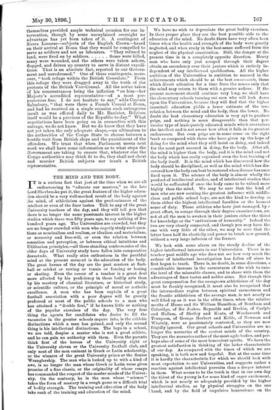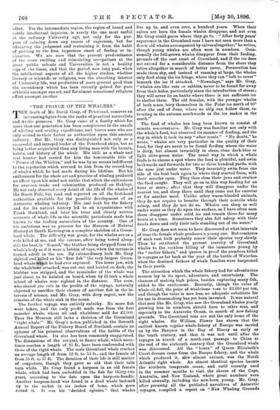THE MIND AND THE BODY.
IT is a curious fact that just at the time when we are all endeavouring to "educate our masters," as the late Lord Sherbrooke put it, the great feature of the higher educa- tion should be a very well-marked revolt of the body against the mind, of athleticism against the predominance of the intellect or even of the finer tastes. Talk to any of the great University teachers of the day, and they will tell you that there is no longer the same passionate interest in the higher 3tudies which there was fifty years ago, to say nothing of five hundred years ago. The Universities are crowded, but they are no longer crowded with men who eagerly study such ques- tions as nominalism and realism, or idealism and materialism, or necessity and free-will, or even the relation between sensation and perception, or between ethical intuitions and Utilitarian principles,---all these standing controversies of the older days of University study have fallen into comparative desuetude. What really stirs enthusiasm in the youthful mind at the present moment is the education of the body. The great heroes of the day are the past masters at foot- ball or cricket or rowing or tennis or fencing or boxing or skating. Even the career of a teacher is a great deal more affected by his proficiency in these bodily arts than by his mastery of classical literature, or historical study, or scientific culture, or the principle of moral or w3thetic excellence. A man who has been captain of a great football association with a poor degree will be greatly preferred at most of the public schools to a man who has attained a "double first," if he knows little or nothing of the popular exercises of the day. The very first thing the agents for candidates who desire to fill the vacancies in the greater schools inquire into, is the athletic distinctions which a man has gained, and only the second thing is his intellectual distinctions. The boys in a school, we are told, despise a master who is not a. great athlete, and he can gain no authority with them. Even the parents think first of the heroes of the University eight or the University eleven or the University football club, and only next of the men eminent in Greek or Latin scholarship, or the winners of the great University prizes or the Senior Wranglership. The man who is looked up to with a kind of awe, is no longer the man whose Greek or Latin verse gives promise of a fine classic, or the originality of whose essays has commanded the respect of the master minds of the Univer- sity. On the contrary, he is the man whose " science " takes the form of mastery in a rough game or a difficult trial of bodily strength. The training and education of the body take rank of the training and education of the mind. We have no wish to depreciate the great bodily exercises. In their proper place they are the best possible aids to the education of the mind. No doubt there have very often been times when the health and strength of the body were greatly neglected, and when study in the best sense suffered from the neglect of the physical constitution. Still, the danger at the present time is in a completely opposite direction. Heavy men who have only just scraped through their degree obtain an ascendency over their juniors which is entirely in- dependent of any intellectual qualification. All the higher ambition of the Universities is ambition to succeed in the achievements which should be at the best amusements, those which divert attention for a time from the muses only that the mind may return to them with a greater ardour.. If the present movement should continue very long, we shall have the elementary schools turning out men who will look down upon the Universities, because they will find that the higher (nominal) education yields a lower estimate of the true relation between the mind and the body, than the lower. No doubt the best elementary education is very apt to produce prigs, and nothing is more disagreeable than that par- ticular type of inadequately educated minds which overvalues the intellect and is not aware how often it fails in its greatest endeavours. But even prigs are in some sense on the right track as compared with those who have given up the hope of doing for the mind what they still insist on doing, and indeed for the most part succeed in doing, for the body. After all, the mind is higher than the body, and it is the mind and not the body which has really organised even the best training of the body itself. It is the mind which has discovered how the body should be disciplined, as well as the mind which has dis- covered how the body can best be restored when disease has once fixed upon it. The science of the body is almost wholly the product of intellectual studies, and of intellectual studies that would be suffocated if once the body came to be valued more highly than the mind. We may be sure that the kind of men who are now earning the greatest influence with middle- class and public school boys, are not the kind to develop in them either the highest intellectual faculties or the keenest sense of duty. Those athletes who have just managed, by e great effort, to scrape through their degree examinations, are not at all the men to awaken in their juniors either the thirst for knowledge or the "enthusiasm of humanity." Indeed the two are very closely connected, and though you may have the one with very little of the other, we may be sure that the latter loses half its elasticity and power to break new ground, without a very large infusion of the former.
We look with some alarm on the steady decline of the higher intellectual interests in our Universities. There is no teacher past middle age who does not see how very much the ardour of intellectual investigation has fallen off since he first began to teach. There is, no doubt, in some directions, a considerable increase in the earnestness of the wish to raise the level of the miserable classes, and to share with them the advantages of finer tastes and nobler aims. But though this great compensation for the overgrown athleticism of the day must be frankly recognised, it must also be recognised that the intermediate region between spiritual earnestness and the frantic athleticism of the average man, is not nearly as well filled up as it was in the olden times, when the relative merits of Hume and Sir William Hamilton, of Bentham and Coleridge, of Sir Joshua Reynolds and Ruskin, of Carlyle and Hallam, of Shelley and Keats, of Wordsworth and Tennyson, of George Herbert and Keble, of Newman and Whately, were as passionately contested, as they are now frigidly ignored. Our great schools and Universities are no longer the nurseries of the acutest minds of the country. They are the nurseries rather of the most agile bodies, and per- haps also of some of the most benevolent spirits. We have the greatest satisfaction in thinking of the latter characteristic of our day. As compared with the times of which we are speaking, it is both new and hopeful. But at the same time it is hardly the characteristic for which we should look with most expectation to our Universities, and suggests rather a reaction against intellectual pursuits than a deeper interest in them. What seems to be the truth is that in our own day the thirst of the young is for some kind of eager excitement, which is not nearly so adequately provided by the higher intellectual studies, as by physical struggles on the one hand, and by the field of impulsive benevolence on the other. Yet the intermediate region, the region of broad and eubtle intellectual inquiries, is surely the one most useful at the ordinary University age, not only for the pur- pose of calming down any excess of eagerness, but for educating the judgment and restraining it from the habit of yielding to the first imperious onset of feeling or in- dication. We are sure that the present predominance of the more exciting end stimulating occupations at the great public schools and Universities is not a healthy sign of t he times, and that the period, now long past, when the intellectual aspects of all the higher studies, whether literary or scientific or religious, was the absorbing interest of University life, was productive of more general good than the ascendency which has been recently gained for pure athletics amongst one set, and for almost sensational religious effort amongst another.



































 Previous page
Previous page